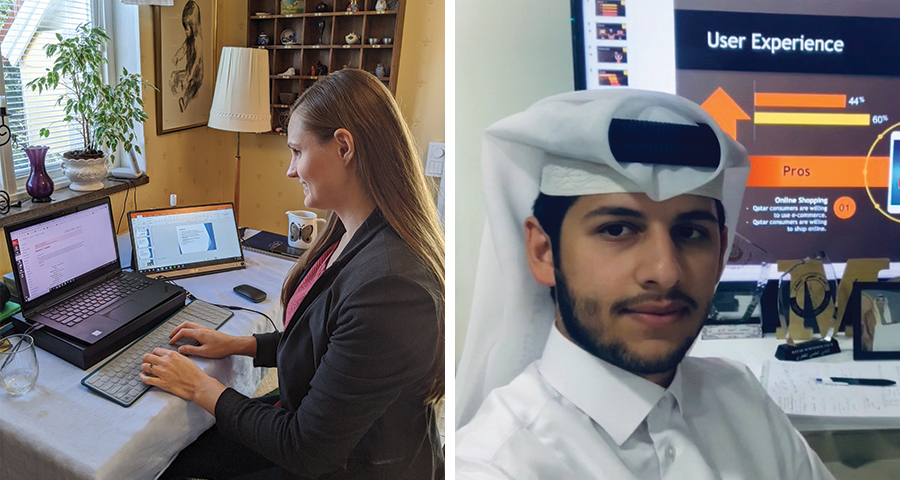
How CMU-Q innovators learn lessons online: Part 2
On March 10, 2020, schools and universities across Qatar closed their doors, as part of the measures introduced to halt the spread of Covid-19. The unprecedented closures heralded a period of rapid change for the education sector.
Six months on, we asked Lauren Burakowski, assistant teaching professor, psychology and Mohammed Al-Qassabi, an information systems junior at Carnegie Mellon University in Qatar (CMU-Q) how they adapted to the shutdown, the effect that remote learning has had on education, and their hopes – and fears – for the future.
In the second part of this special two-part series, a CMU-Q student and a faculty member reflect on life under lockdown.
What were your initial thoughts when you learned that schools and universities across Qatar would close due to the Covid-19 pandemic?
Lauren Burakowski: My initial thoughts were “What, how, why? For how long? How will we make sure that our students still get the education they deserve? How will we teach? What about research? I was also concerned about my family back home.
In what ways did your daily routine change as a result?
Mohammed Al-Qassabi: I used to wake up early in the morning to go to class and then exercise in the evening. When the university closed, I started waking up a bit later since classes were being hosted online. I was used to exercising and moving my body on a daily basis, it was a difficult transition for the first month at home.
I adapted my routines and started working with the Qatar Scientific Club to produce reusable face shields, face masks, and medical products. We distributed them to medical institutions and hospitals to help protect the medical community who are working hard to protect us. The face shields were designed and produced by the Qatar Scientific Club using 3D printers and CNC machines.
What challenges did you experience as a result of the closure?
Burakowski: I am fortunate to have an engaging, stable job, so my challenges have been less severe than what others have faced. I have a wonderful family and was happy to be at home. I spent more time with my parents than I have in years. Personally, it was a bit challenging at first. Aligning different schedules and expectations takes time. Keeping things in perspective helps.
Professionally, teaching remotely is a challenge, until we all become used to it. Developing the skills for in-person teaching did not happen overnight and the same is true for remote teaching. It just takes some time to learn the ropes, but thankfully CMU-Q has many resources devoted to helping faculty learn these new skills quickly.
In what ways do you think education, and learning methods in general, will change permanently as a result of recent events?
Al Qassabi: The pandemic transitioned us into online learning but it has shown that even after the pandemic, we can continue to learn remotely. Courses can remain online in a flexible manner, especially electives or mini courses. Students from our different campuses (Pittsburgh, Doha) would be able to come together through these online opportunities.
How has CMU-Q shown adaptability during remote learning?
Burakowski: CMU-Q is exploring a wide variety of ways to engage students and create a feeling of community. We created a space for faculty to come together around topics that support remote education design and instruction and learn from both each other and the Eberly Center for Teaching Excellence. We are trying new things and questioning previously-held assumptions about the way things have been.
We are pushing to figure out what we can do better, what we can do differently, to support student learning. Newly adopted models of delivery, new technologies, and different modes of instruction are helping the faculty adapt to support students interaction and learning. We are also finding new ways to engage with students and the broader community virtually – both the Edge Summer Program and First Year Orientation were virtual and a big success this year.
In what ways, if any, do you think that the global response to the pandemic has made your program area more relevant?
Al Qassabi: As an information systems student, I saw how everything depended on technologies in order to respond to the pandemic.
Burakowski: It’s more important to understand human cognition and the context in which people live and learn now more than ever. This work will become increasingly relevant as we explore attitudes and cognition around climate change, including how the pandemic might influence responses to environmental crises.
What are you most looking forward to about returning to the university when possible?
Al Qassabi: Everything. Seeing my friends, my classmates and faculty and staff. Studying on campus, going to the library, student activities, Student Majlis.
Burakowski: Connecting with students, seeing my colleagues, running into people in the hall, and just having a casual conversation!
